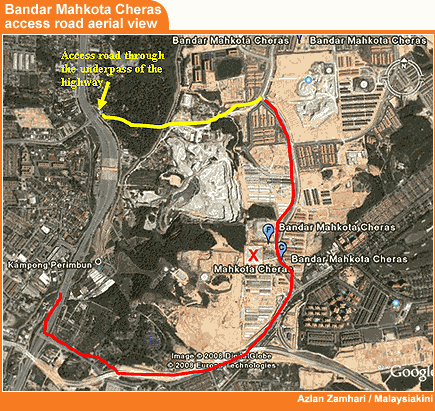I refer to the Malaysiakini report Angry residents dismantle barriers again .
I followed the media reports regarding the Cheras-Kajang Highway concessionaire, Grand Saga and the plight of the Bandar Mahkota residents.
According to the reports, Grand Saga business development and corporate affairs executive director Zainal Abidin Ali said while he sympathised with the residents for being forced to use a longer route, Grand Saga has to close it due to safety concerns.
We urge Grand Saga not to manipulate the word ‘safety’ as a ticket out of this situation. The developers, as part of their social obligation to road users, must have humanised their design rather than focusing on maximum profit generation.
If safety is of concern, the developers should work together with the residents and other independent parties to study the extent of unsafe factors of the blocked access road and rectify it together with the local government and the Works Ministry whoever has the jurisdiction.
All 15 of the 22 highways in the country are said to be making profits (as indicated by the Works Minister and this includes Grand Saga). Increasing volume of vehicles, urban migration and land development in the areas around the Grand Saga highway will surely ensure profits for the concessionaire for a long time.
The standoff by residents of Bandar Mahkota, Cheras is not the first in Malaysia concerning highway construction. If safety was a concern for concessionaires and those offering the concessions, then we will not have highways like the KL-Putrajaya running behind residents’ backyards in Sri Petaling or just few metres away from shop houses in Port Klang.
The residents of Sri Petaling also demonstrated against the highway but failed to stop construction and the their house value depreciated due to the construction of the stretch of the KL-Putrajaya Highway passing through Sri Petaling.
Cheras is also known to be notorious for traffic jams, despite having highways. Most of the highways in Klang Valley have not realized the objectives they were meant for i.e to reduce traffic congestion. Instead unchecked increase in conventional vehicles (not energy saving) have resulted in negative social and environmental impacts.
Stress suffered by road users leads to blurring judgment and results in rash decisions by road users which then increases risk of accidents among road users. The increased number of conventional fuel-intensive vehicles is perhaps one of the major contributors of green house gasses in Malaysia. During traffic jams we witness many folds increase in traveling time fuel consumption and emissions.

In the context of the UN guidelines for Consumer Protection and the Rio Declaration, consumers have the right to choose and if consumers choose to practice sustainable consumption it is the state’s obligation and responsibility to protect and support them. In the case of the Bandar Mahkota, Cheras residents have chosen shorter routes, perhaps saving fuel, time and money.
Consumers also have the right to redress (seek compensation), right to healthy and sustainable environment and the right to be heard. The four rights mentioned are among the eight universal consumer rights. Why are Malaysian consumers as users of products and services subject to gross violation of their rights by both state and corporate?
Inconsiderate and irresponsible land developments indicate sheer absence of awareness on the seriousness of global warming among policy makers and private companies such as the highway concessionaires. It also indicates sheer ignorance towards the environmental and societal needs of the people.
Most construction work of highways, roads and land development along the highways does not effectively engage stakeholders who are directly affected by the development. Klang (as reported by the media) for instance, has been subjected to unplanned land development resulting in massive traffic congestion, isolated flooding and, of course, pollution of river, air and land.
We have come across demographic statistics showing the population of Klang reaching one million and shopping complexes, housing estates and business center projects were being approved and former agriculture land (estates) being developed for the projects. This kind of irresponsible development of course does not engage the stakeholders.
Worse still are the sufferings of residents in Taman Garing, Rawang. Improper maintenance and insincere measures taken to manage flooding and runoffs have caused insurmountable loss to the residents due to mud floods and flash floods.
We sincerely hope that the developers, the state and local governments are mature enough and be able to think far ahead on how traffic jams and unplanned developments results in economic implications: loss of man hour, accidents, ‘medical leave due to air pollution related and other pollution related diseases, stress related diseases and many more.
We urge that all those involved in the planning of corridors and other forms of land development; right from the federal government, state government and local government to the private sectors to have strong sense of social responsibility in approaching development based on people, planet and profit.
The writer is director, Malaysian Association of Standards Users.

